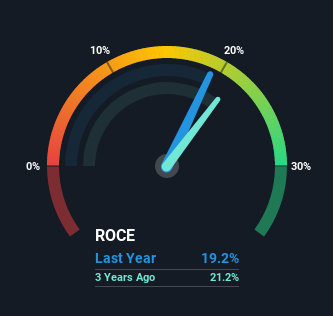Rocky Mountain Chocolate Factory (NASDAQ:RMCF) Has Some Difficulty Using Its Capital Effectively
When it comes to investing, there are some useful financial metrics that can warn us when a business is potentially in trouble. When we see a declining return on capital employed (ROCE) in conjunction with a declining base of capital employed, that's often how a mature business shows signs of aging. Trends like this ultimately mean the business is reducing its investments and also earning less on what it has invested. Having said that, after a brief look, Rocky Mountain Chocolate Factory (NASDAQ:RMCF) we aren't filled with optimism, but let's investigate further.
Understanding Return On Capital Employed (ROCE)
Just to clarify if you're unsure, ROCE is a metric for evaluating how much pre-tax income (in percentage terms) a company earns on the capital invested in its business. Analysts use this formula to calculate it for Rocky Mountain Chocolate Factory:
Return on Capital Employed = Earnings Before Interest and Tax (EBIT) ÷ (Total Assets - Current Liabilities)
0.19 = US$4.3m ÷ (US$26m - US$3.6m) (Based on the trailing twelve months to May 2021).
Therefore, Rocky Mountain Chocolate Factory has an ROCE of 19%. In absolute terms, that's a satisfactory return, but compared to the Food industry average of 10.0% it's much better.
See our latest analysis for Rocky Mountain Chocolate Factory
Historical performance is a great place to start when researching a stock so above you can see the gauge for Rocky Mountain Chocolate Factory's ROCE against it's prior returns. If you're interested in investigating Rocky Mountain Chocolate Factory's past further, check out this free graph of past earnings, revenue and cash flow.
The Trend Of ROCE
We are a bit worried about the trend of returns on capital at Rocky Mountain Chocolate Factory. Unfortunately the returns on capital have diminished from the 27% that they were earning five years ago. And on the capital employed front, the business is utilizing roughly the same amount of capital as it was back then. Since returns are falling and the business has the same amount of assets employed, this can suggest it's a mature business that hasn't had much growth in the last five years. So because these trends aren't typically conducive to creating a multi-bagger, we wouldn't hold our breath on Rocky Mountain Chocolate Factory becoming one if things continue as they have.
On a related note, Rocky Mountain Chocolate Factory has decreased its current liabilities to 14% of total assets. That could partly explain why the ROCE has dropped. Effectively this means their suppliers or short-term creditors are funding less of the business, which reduces some elements of risk. Since the business is basically funding more of its operations with it's own money, you could argue this has made the business less efficient at generating ROCE.
Our Take On Rocky Mountain Chocolate Factory's ROCE
In the end, the trend of lower returns on the same amount of capital isn't typically an indication that we're looking at a growth stock. And, the stock has remained flat over the last five years, so investors don't seem too impressed either. That being the case, unless the underlying trends revert to a more positive trajectory, we'd consider looking elsewhere.
On a final note, we found 3 warning signs for Rocky Mountain Chocolate Factory (1 is concerning) you should be aware of.
For those who like to invest in solid companies, check out this free list of companies with solid balance sheets and high returns on equity.
This article by Simply Wall St is general in nature. We provide commentary based on historical data and analyst forecasts only using an unbiased methodology and our articles are not intended to be financial advice. It does not constitute a recommendation to buy or sell any stock, and does not take account of your objectives, or your financial situation. We aim to bring you long-term focused analysis driven by fundamental data. Note that our analysis may not factor in the latest price-sensitive company announcements or qualitative material. Simply Wall St has no position in any stocks mentioned.
Have feedback on this article? Concerned about the content? Get in touch with us directly. Alternatively, email editorial-team (at) simplywallst.com.

